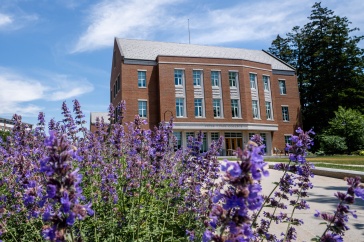
An internship that turned into a part-time job helped Conor McFarland '17 understand just how lacking affordable housing is in the state of New Hampshire, leading him to want to know more. And that led to his project, “The Scarcity of Affordable Housing in New England,” the results of which he presented at the Peter T. Paul College of Business and Economics Thursday during the 18th annual Undergraduate Research Conference (URC).
“The most interesting thing I have learned during this project is that many states have extremely different housing climates,” says McFarland, a senior majoring in economics and minoring in Spanish. In fact, housing in New England is often twice as expensive as in other areas of the country.
For the past 11 months, McFarland has been an intern at the New Hampshire Community Loan Fund (NHCLF) in Concord, where he works on the Resident-Owned Communities-NH (ROC-NH) program. His initial internship was part of the social innovation internship program through the UNH Center for Social Innovation and Enterprise.
“At ROC-NH, we help low- and moderate-income manufactured housing communities transition from private ownership to resident ownership. Essentially, we lower the cost of living for these residents in the long run by helping them form a housing cooperative and then purchase their land,” McFarland says, adding, “My internship at ROC-NH has made me passionate about affordable housing.”
His work at NHCLF and the research he conducted for the URC helped increase his knowledge about such measures as housing vouchers and low-income housing tax credits (LIHTC ) that encourage development of affordable housing.
“Statistically, both rental vacancy rates and LIHTC units were significant in New Hampshire,” McFarland says, comparing state statistics. “In my model, rental vacancy rates in New Hampshire do increase median rent. I would expect that this is because property owners tend to raise their rents marginally when they have too much vacancy. After further analysis, it was clear that the coefficient for the LIHTC units added didn't affect the model nearly as much as rental vacancy.”
McFarland also noted that affordable housing programs promote homeownership, provide access to capital and create more affordable housing options.
“Community development financial institutions, community development corporations and other affordable housing initiatives are crucial for preserving workforce housing in New England,” McFarland says.
A New Hampshire resident, McFarland also participated in the 2016 Social Venture Innovation Challenge. He is pursuing a full-time job with New Hampshire Community Loan Fund.
Photo gallery from economics poster session
-
Written By:
Jody Record ’95 | Communications and Public Affairs | jody.record@unh.edu
















































